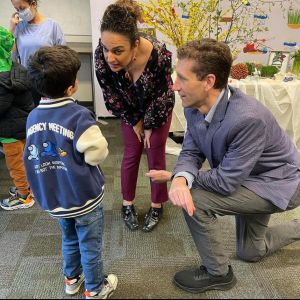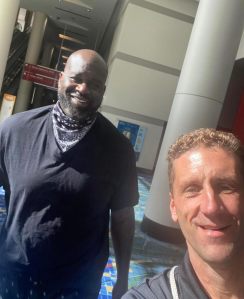 The tradition continues! Like Darlene Love performing on David Letterman, or gathering the family around the TV to watch Elf and Christmas Vacation – it is year 14 for the annual year-end post at the Culture of Yes. If this post is your first “Top 3” List – you get a mash-up of your aunt’s family Christmas letter and one of those countdown lists that everyone has to finish the year. Thanks for once again being a part of this community in 2023.
The tradition continues! Like Darlene Love performing on David Letterman, or gathering the family around the TV to watch Elf and Christmas Vacation – it is year 14 for the annual year-end post at the Culture of Yes. If this post is your first “Top 3” List – you get a mash-up of your aunt’s family Christmas letter and one of those countdown lists that everyone has to finish the year. Thanks for once again being a part of this community in 2023.
If you are wondering what you might have missed, here are the previous years Top 3 lists: 2022 (here) 2021 (here) 2020 (here) 2019 (here) 2018 (here) 2017 (here) 2016 (here) 2015 (here) 2014 (here) 2013 (here) 2012 (here), 2011 (here) and 2010 (here).
Now, on with this year’s results:
Top 3 “Culture of Yes” Blog Posts which have generated the most traffic this year:
Interesting to see that the three most personal pieces I wrote this year were the most read. I made a commitment this year to trying to write some longer stories, and the first one I did, The Most Important Game of My Life, has already become one of my most read posts ever. I will try to tell more stories again in 2024. Also, interesting is to see how people land on my blog. I have had a steady flow of about 1000 people opening it via email for the last decade. And in the past, most of those who found specific posts, reached the blog via Twitter (X) or Facebook. Both of these have declined, and LinkedIn is becoming a more popular referrer to the CofY. It is interesting to see what happens as the traditional social media spaces all seem to be having their challenges so where will people go to share and connect? And what was the least read post of the year? Leaders lending their calm. Having done this for a while – I can usually predict which posts will resonate more widely – based on the topic and timing of publication. Of course, as I have often written, the blog is not just about clicks (Though, I do like my metrics).
Top 3 Shifts in BC Education in 2023:
- Updates to the Student Reporting Order – a number of modernizations but most attention around no letter grades at grades 8 and 9
- Bill 40 – acknowledge the crucial importance of First Nations involvement in the education of Indigenous students
- AI – probably on every list like this, not only in education but in every industry
Top 3 Local Education Stories from 2023 that will still be hot in 2024:
- Teacher Recruit and Retention
- More students
- A focus on literacy and numeracy
The first two of these are really related. As we see more students, there will be even more pressure for more teachers. The teacher recruitment and retention trend is not a local issue, but a global issue. The current North American strategy seems to be to take teachers from other places. Of course, this short-term fix does not really address the problem. We need more people wanting to become teachers and new pathways for them to become qualified. Canada’s huge population increases are being felt in schools, and this too seems to be continuing into 2024. One of my last post this year (HERE) focused on the latest round of PISA results helped to focus attention on literacy and numeracy. Again, it is not only British Columbia, but more broadly across Canada, there is going to be attention on the traditional core learning skills.
Top 3 Predictions for other edu-trends in 2024:
- More computers but fewer phones in schools
- Focus on supporting leaders and leadership
- Efforts to see longer term impacts of COVID on education
We are allowed to let our thinking evolve over time, and I am less bullish on my views of cell phones in schools than I was a decade ago. 10 years ago, I saw cell phones as a way to bring the internet to all students. As more students brought a larger internet device (table, laptop, etc.) the cell phones purpose for this diminished. I most recently wrote about phones in school in 2019 when I suggested we ban parents from using them (I still hold to this view!). I would suspect more discussions like those now in Ontario, that place more limits on phones in schools. In the previous topic, I wrote about the broad need for more teachers. There is also a need to support those in and aspiring to school and district leadership. We are seeing fewer people looking towards these positions, and this reality is something I hear from many of my superintendent colleagues. As Mark Perna wrote in Forbes this past summer, “The looming shortage of quality school leaders is everyone’s problem.” Finally with the long term impacts of COVID – there is more data being released that shows shifts in mental health and learning levels post-COVID compared to pre-COVID. There is a lot to unpack here, and need to understand what we need to do differently going forward if our student population is simply different than it was before.
Top 3 Free AI Tools for education I have used (not counting ChatGPT):
I will be clear I am a novice hear, and likely use far fewer tools than many of you reading this post. While ChatGPT got all the attention, there are many other AI tools being integrated into schools.
I get sent a lot of videos and sometimes you just want a quick summary – that is where summarizetech comes in. You add the YouTube link and it gives you an AI generated summary of the video.
I have used AudioPen to help get me started on emails and blog posts. You speak into the microphone (you can even ramble) and it converts to text and then cleans it up.
Fathom is one of a few meeting summary tools I have tried. While I am not on Zoom as much as I was a couple years ago, these tools use AI to summarize meetings and dispense of the need for a notetaker.
And I also need to mention that before using any of these tools with students, one needs to be careful of privacy and security issues that must be considered.
Top 3 artists for me according to Spotify this year:
- Paul Simon
- Simon and Garfunkel
- James Taylor
Just what year was this for? My music tastes are pretty stable. My only “new” artist in the Top 10 was Ocie Elliot – a folk duo out of Victoria. As much as I champion change if the music came out after the start of this century, it is very difficult to convert me into a fan.
Top 3 new (at least to me) podcasts I began to listen to in 2023:
Good Sport from TED is hosted by Jody Avirgan. This show is not your regular sports podcast – Jody shares stories you are not hearing elsewhere. If you are looking for an episode to start with, I would try: From F1 to Banana Ball: How to Make a Fan. The Economics of Everyday Things is a quick weekly podcast – usually just about 15 minutes. Zachary Crockett is also a great storyteller. A first one I would recommend is his episode on the economics of Girl Guide Cookies. Finally, the Jar Jar podcast is a quirky six-episode series on one of the most hated movie characters of all-time. I remember the controversy when the film came out, and it was interesting to revisit it, also see it in the context of information spread during the early internet.
Top 3 people keeping Canadian educators connected:
- Dean Shareski
- Robert Martellacci
- Karen Yamada
Dean Shareski has appeared on this year-end blog in other categories before, but this year it is for some new work he has taken on. He has started a regular podcast where he interviews educational leaders across the country. The CanadianED Leadership Show is a great listen for everyone who is interested in education. His interview with John Malloy was my favourite of 2023. Nobody is better at making connections in Canadian education that Robert Martellacci. His Mindshare Learning has been the go-to spot for innovation in Canadian education for 20 years. Robert knows everyone and is one of the most positive and curious people I have met. I have known Karen for more than a decade. She has helped steer the C21 Superintendent Network over this time. Karen brings people together around big ideas and finds connections across Canada. With little federal involvement in education in Canada, we are fortunate to have Dean, Robert and Karen keeping the country linked together.
Top 3 edu-related TED Talks I watched this year:
-
The rise of the “trauma essay” in college applications
2. How to make learning as addictive as social media
3. How AI could save (not destroy) education
Top daily 3 streaks I still have going:
- 10,000 Steps
- Running 5 km a day
- Photo posting to Instagram
Hey – aren’t those the same from last year? Why yes, they are – but that is a sign they are good streaks. The steps streak in now at every day for 10 years. I wrote about the running streak HERE when I crossed the 1000 day mark, and I continue to post a photo every day – something that is now at 9 years and counting.
Top 3 photos from this past year that make me smile:

I have such a great job connecting with students. Elementary students telling me about their learning is so awesome!

University limits the days everyone is together in our house – but they will still find a way to go strawberry picking on Father’s Day!

One of my summer joys is I get to travel around North America coaching basketball. And this past summer look who I ran into in Chicago!
As I have noted above, I still post a photo a day – well over 3,000 straight days of this. And I save them to my Archive in Instagram. And scrolling through them always brings me joy. I shared the 3 above – but I could have picked dozens of them – each one with a story.
Final Thoughts
The Culture of Yes continues to roll on. I have always written about doing it for myself, but it still feels good when someone references something I wrote – event sometimes a decade ago that made them think or act differently.
It will be interesting to see how AI impacts blogging going forward. I have begun to use Chat GPT in my writing process quite regularly, but in a supporting role to my creative thought.
As our traditional media has contracted even more in recent times, I feel more determined than ever to write regularly and help influence conversations around education. This space continues to be my favourite for thinking about, and working through ideas around education as it is and how it could be.
To all my friends and colleagues in West Vancouver and beyond still reading, hopefully you have a great year to reflect on.
All the best for a wonderful 2024.









